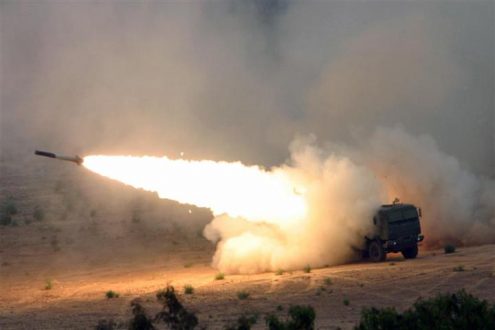Syria has become Iran’s Vietnam
As if the Iran nuclear issue was not already difficult enough, it became even more complicated when Bashar al-Assad unleashed his chemical weapons across Damascus suburbs last month. Suddenly, the Syria issue is overshadowing all other factors concerning Iran.
The Obama administration is increasingly justifying its decision to respond militarily to Assad’s chemical weapons use in terms of the likely impact on Iran. Certainly, punishing Assad for crossing Obama’s red line on chemical weapons will make it less likely that Iran will cross Obama’s red line on the production of nuclear weapons.
U.S. deterrence against weapons of mass destruction will be strengthened worldwide. North Korea, for example, which has even more chemical weapons than Syria, will be on notice not to even think about using them in any provocation against South Korea or in any conflict that might erupt as a result of a provocation.
Retaliatory strikes against Assad will also reinforce allies’ confidence that the United States has their back. In deciding last year not to order a unilateral attack on Iranian nuclear facilities, Israeli Prime Minister Benjamin Netanyahu was persuaded that Obama would not let Iran become nuclear-armed. Netanyahu’s faith in that assurance will be stronger if Obama demonstrates he is both willing and able to employ military power against Syria.
Personal credibility
It’s not so much Obama’s personal credibility as the United States’ strategic credibility that is at stake. Letting Assad go unpunished could be the straw that breaks Netanyahu’s faith in the United States and leads to a premature and counterproductive Israeli attack on Iran that then brings the United States into an unwanted war.
On the other hand, U.S.-led air-strikes against Syria could set back prospects for peaceful resolution of the Iranian nuclear issue. A real solution to the problem is probably impossible, given the depth of differences between the protagonists: Iran wants a nuclear weapons capability and its adversaries don’t want Iran to have it.
Short-term confidence-building measures may be possible now that Hassan Rowhani is in the presidency, but even such interim steps will require Iran to accept limits, such as shutting down operations at the Fordow enrichment plant, that so far have been out of the question in Tehran. Rowhani would be hard-pressed in the best of circumstances to persuade hardliners to accept such compromises. If their Syrian comrades-in-arms are attacked by the United States, the hardliners will be smarting for revenge, not reconciliation.
The hardliners’ mood will be especially dark if Iranian Revolutionary Guard Corps (IRGC) ‘advisors’ suffer losses in the bombing. Given the extensive military support that Iran has been providing Assad, some Quds forces are likely to get caught in the crosshairs. This could trigger an asymmetric response.
Already there is a report that the IRGC has instructed militia proxies in Iraq to attack U.S. interests there in reprisal for any U.S. strikes on Syria. Iran won’t want to get dragged into a war with the U.S. because of Syria, but unintended escalation could ensue anyway.
As much as Rowhani will oppose action that could lead to conflict with the United States, he does not control the IRGC. At the very least, they will redouble their supply of armaments to Assad’s forces, using Iraqi airspace and highways as transit routes.
Gaming out the potential impact on the Iranian nuclear program is one reason to limit U.S. air-strikes, which should in any case be proportionate to Assad’s crime. Rowhani likely will have heard from former U.S. diplomat Jeff Feltman, now U.N. Under-Secretary for Political Affairs, who visited Tehran last week, that the limited U.S. strikes are not directed against Iran’s interests.
Mission creep
That message should be repeated and honored. The Iran angle is not a justifiable reason for refraining from punishing Assad, but it is among the reasons for avoiding mission creep.
Meanwhile, it is Iran rather than the United States that stands to lose most from the Syrian conflict. Tehran’s backing of Assad’s brutality casts it in a villain role on the Arab street throughout the Sunni world. Iran’s pretentions that its own 1979 Islamic revolution was a precursor to the Arab Spring have been shown to be manifestly hypocritical.
And now Assad’s chemical-weapons slaughter of women and children has exacerbated divisions in Iran itself, with former president Akbar Hashemi Rafsanjani accusing the Syrian government. The Iranian people know that the armaments and financial props that Iran provides Assad soak up revenues that are more precious with each new sanctions measure Iran faces. In many ways, Syria has become Iran’s Vietnam: a quagmire from which it has no apparent escape.
Best option
Iran’s Syria predicament gives the United States new-found leverage. The best option for Iran is to lend its weight to a negotiated settlement on Syria. Seeing itself as the major power in the region, Iran has always wanted to be part of any Syria peace talks. Now, more than ever, it desperately wants to join Geneva-II as a way out of its predicament.
Whether or not Obama can bring the fractious Syrian opposition into peace talks, he does have the power to say yes or no to Iranian participation. To date, the arguments for not inviting Iran have won out: it has been part of the problem. But the Iranians can also be part of the solution, not least because of their leverage over Assad.
Iran’s desire to be at Geneva-II is why U.S. air-strikes against Syria need not set back nuclear negotiations for very long. Obama should play the Syria card to get Iran to engage meaningfully on the issues of most importance for each.
This article is from the IISS and was originally published at IPS New Service on September 6, 2013.


